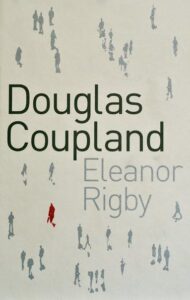
Loneliness, purpose, existence, and the meaning of it all. You won’t get answers to any of life’s questions, but you’ll get perspective and something to think about from Liz Dunn’s first-person narrative and life in Eleanor Rigby by Douglas Coupland.
Liz is lonely, and she’s not in denial about this. But when her son, whom she gave up for adoption, lands in the emergency room with her phone number on an “in case of emergency contact” bracelet, everything changes.
The story of his conception is a blur. But this story is more of a slice of life than you would expect given how much all of the “blurbs” out there focus on the long-lost given-up-for-adoption son’s return. I didn’t even want to mention it, but it’s literally everywhere you look.
 Before his arrival, we learn about Liz’s daily life. Afterward, it’s a meandering of life’s daily ups and downs told through our characters. Good days, bad days, complex family dynamics. Despite the fact that the story as a whole is relatively linear, we go back and forth from past and present as stories are told through narratives or conversations.
Before his arrival, we learn about Liz’s daily life. Afterward, it’s a meandering of life’s daily ups and downs told through our characters. Good days, bad days, complex family dynamics. Despite the fact that the story as a whole is relatively linear, we go back and forth from past and present as stories are told through narratives or conversations.
Through the narratives, be it dialog or from our main character Liz, small tidbits of philosophical discussion are dropped like pebbles. Instead of leading us somewhere, however, they start to roll down a hill. If you let it, your mind will drift to places while you’re holding the book, and time will have passed as you’ve gone through an entire mental discussion with yourself only to find that you’re still holding the book.
That’s not completely unique to this title, or even Coupland’s work as an author, but it happened a few times while I was reading this. Above all, I really enjoyed how this book unfolds. The order of events doesn’t happen in a chronological way, because it allows the characters a means to determine the narrative more than just the author utilizing linear storytelling.
While at the top I did say Eleanor Rigby contains “Loneliness, purpose, existence, and the meaning of it all,” that doesn’t mean this is a depressing book. It’s certainly deep, but I wouldn’t call it depressing. Reading about loneliness, or even discussing it, isn’t depressing. And while that may seem like a logic trap, it’s not. And if you don’t know what I mean, you will once you read this book.
 Is it for everyone? I’m not so sure. Fans of Coupland will almost certainly enjoy it. Most people over 35 will likely take some meaning from it. But it seems like a hard read for someone in their teens and twenties. That’s not because they won’t understand what it’s like, but because the world is still fresh for them.
Is it for everyone? I’m not so sure. Fans of Coupland will almost certainly enjoy it. Most people over 35 will likely take some meaning from it. But it seems like a hard read for someone in their teens and twenties. That’s not because they won’t understand what it’s like, but because the world is still fresh for them.
For example, let’s look at time sickness. Liz describes it, saying, “One of my big problems is time sickness. When I feel lonely, I assume that the mood will never pass–that I’ll feel lonely and bad for the rest of my life, which means that I’ve wrecked both the present and the future. And if I look back on my past, I wreck that too, by concentrating on all the things I did wrong. The brutal thing about time sickness is that naming it is no cure.”
To me, this is something that comes not with maturity but with age and the actual living of years. And so, relating to it as a teen might be hard, but you’re welcome to try. Still, I do love a good story within a story. So for me, in my mid-life minus the crisis, this book was enjoyable deep reading.
Read the Secret File of technical information and quotes from Eleanor Rigby.